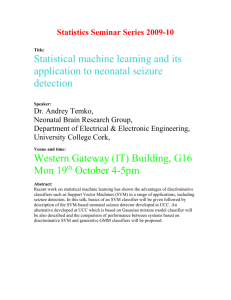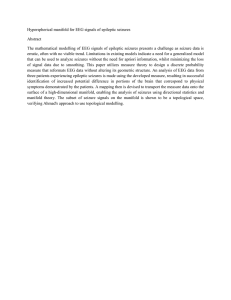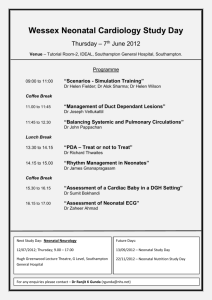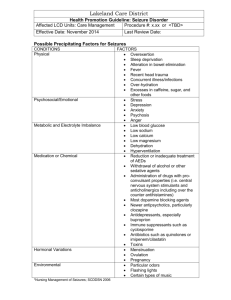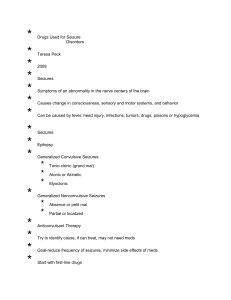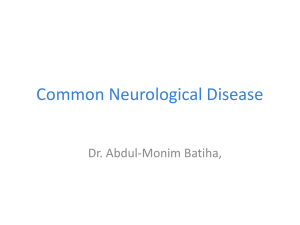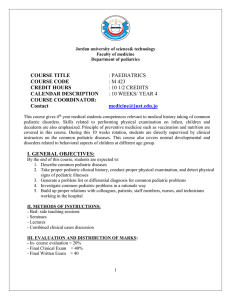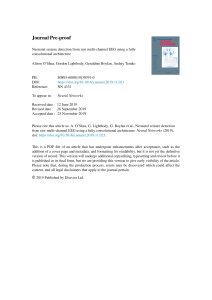Neonatal Seizures Amy Kao, M.D. Division of Neurology Doernbecher Children’s Hospital
advertisement
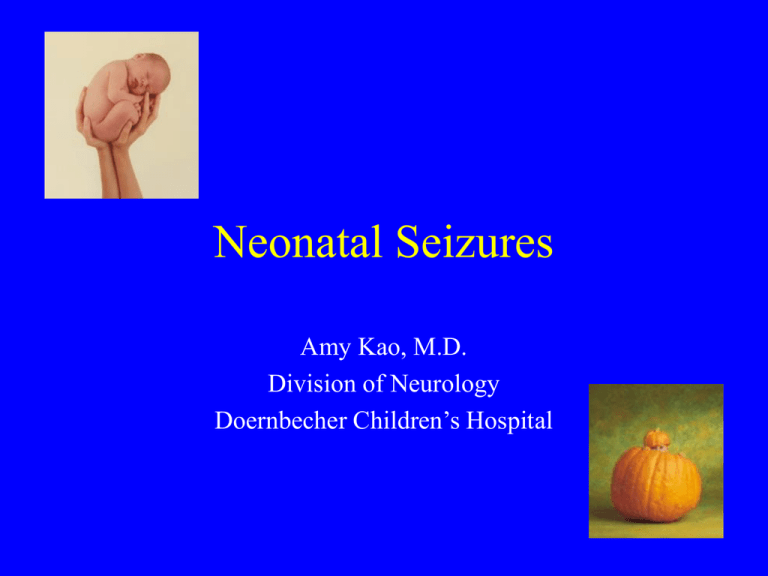
Neonatal Seizures Amy Kao, M.D. Division of Neurology Doernbecher Children’s Hospital Objectives • Review the clinical presentation and differential diagnosis • Discuss pathophysiologic implications on clinical presentation • Review etiology • Apply this information to evaluation and treatment • Discuss prognosis Clinical Classification • Focal/Multifocal Clonic – Not generalized – Migratory – Not necessarily focal etiology • Focal Tonic – Not usually generalized • Generalized Myoclonic Clinical Classification • Subtle (“Hypomotor”) – Motor activity arrest – Apnea – Eye deviation – Autonomic changes • Motor automatisms – Oral-buccal-lingual movements – Swimming – Bicycling The Definition of a Seizure “paroxysmal discharge of cerebral neurons sufficient to cause clinically detectable events that are apparent either to the subject or to an observer” Definition of a Seizure in a Neonate? • Excitatory activity predominates • No paroxysmal discharge on EEG? – True seizure • The cortex is undeveloped • Deeper origin – “Brainstem release phenomena” Definition of a Seizure in a Neonate… • Clinically detectable events? – Subtle – Truly only electrographic • Iatrogenic paralysis • High doses AEDs • Encephalopathy or subcortical/spinal cord damage If It Isn’t a Seizure, Then What Is It?? • Possible clues – Stimulus-induced – Suppressable – No associated autonomic changes (usually not bradycardia) Weird Baby Movements – Jitteriness • Stimulus-sensitive • “Tremor” • Suppressable – Benign neonatal sleep myoclonus – Spinal myoclonus – Apnea of non-neurologic etiology • bradycardia Causes of Neonatal Seizures • Within first 24 hours of life – Hypoxic ischemic encephalopathy – Meningitis/sepsis – Subdural/Subarachnoid/Interventricular hemorrhage – Intrauterine infection – Trauma – Pyridoxine dependency – Drug effect/withdrawal Causes…. • 24-72 hours – Meningitis/sepsis – In premature infants: IVH – In full-term infants: infarction, venous thrombosis – Cerebral dysgenesis Causes…. • 72 hours to 1 week – Above causes – Inborn errors of metabolism – Hypocalcemia – Familial neonatal seizures • 1 week to 4 weeks – Above causes – HSV Other Syndromes • Benign idiopathic neonatal convulsions (BINC or Fifth-day fits) • Benign familial neonatal convulsions (BFNC) • Early myoclonic encephalopathy (EME) • Early infantile epileptic encephalopathy (EIEE) • Glucose transporter type I Evaluation of Neonatal Seizures • • • • Serum lytes (gluc, Ca, Mg, Na) CSF Head ultrasound EEG (B6?) • Tox screen • CT or MRI of brain • ?metabolic w/u, congenital infection w/u Treatment of Electroclinical Seizures • Phenobarbital 20 mg/kg – 10 mg/kg boluses until 40-50 microgm/ml • Phenytoin 20 mg/kg • Lorazepam 0.1 mg/kg • Pyridoxine 50-100 mg IV with EEG Outcome • 45 % controlled after either phenobarb or phosphenytoin • 60 % controlled with both • 30% of survivors develop epilepsy • WORSE: HIE, meningitis, dysplasia • WORSE: electrographic seizures • BETTER: hypoCa, BINC, BIFC, stroke
